
Palestine. What after the genocide? Palestina. ¿Y tras el genocidio? ENG ESP
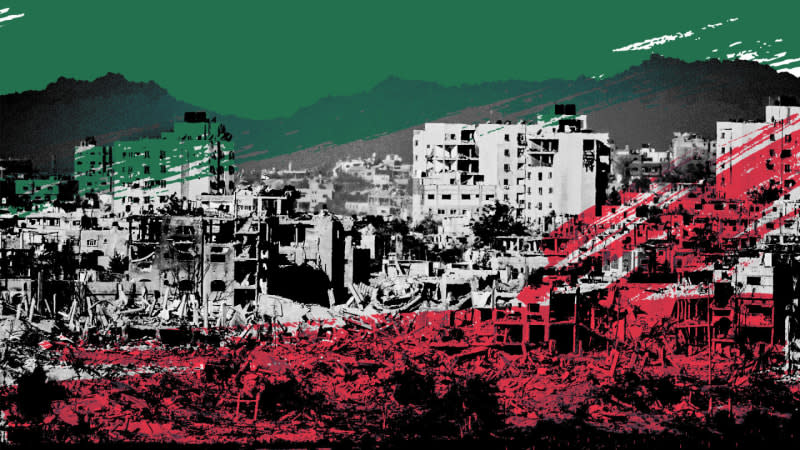
No people could heal without justice, Ningún pueblo puede sanar sin justicia
ENGLISH
9 Oct 2025
After the genocide: What the future holds for Palestine
The Palestinian cause has never enjoyed more momentum, awareness, and global solidarity than it does today.
This is reflected by a wave of international recognition of Palestinian statehood, giant weekly demonstrations in Western capitals, greater isolation of Israel, and a tidal shift in public opinion. Yet the Palestinian movement has also never been in a greater state of disarray, loss, and paralysis.
Gaza is decimated, the Palestinian leadership remains intractably divided, the West Bank is under an unprecedented crackdown, and the Palestine Liberation Organisation (PLO) is obsolete.
As a fragile truce takes hold and potentially signals an end to the war, numerous questions remain unanswered, with Palestinians now facing monumental challenges and uncertainties as they try to recover from two years of unparalleled Israeli violence.
Genocidal trauma: Can Gaza become liveable again?
“We would need to invent brand new words to adequately describe the situation that Palestinians in Gaza find themselves in today,” UN officials said over a year ago.
Indeed, ‘words don’t mean anything anymore’ has become the most common sentiment on the ground in Gaza after two years of mass killing. There is the sense that everything has been said, every feeling expressed, over and over again, until it becomes hollow of meaning or resonance, with silence taking over.
The two key questions Gazans commonly ask each other are technical. First, “is your home still standing?” Yet nearly every single person has had their home bombed, burned to the ground, razed, bulldozed, or blown to pieces. The second is “how many family members have you lost?” The average answer is over 100.
Nonetheless, there is a strong and undying willingness amongst many in Gaza to remain steadfast on the land and reject any plans for expulsion, migration, or displacement. Nada, a mother whose two-year-old son was born only days before the genocide, has lived through the unimaginable.
Displaced several times, starved for long periods, shellshocked, and scarred by losing dozens of her family members, she still refuses to leave Gaza. Asked if she would consider travelling if given the opportunity, she told The New Arab, “Why can’t I stay in my homeland?”
Despite Israel’s destruction of over 90% of all homes in Gaza, there is strong hope that Palestinians can recover, rebuild livelihoods, and heal. “We already went as Palestinians through a similar period, the Nakba, and yet we were able to rebuild our national movement, society and economy,” Xavier Abu Eid, a former senior Palestinian diplomat, told The New Arab.
“Rebuilding Gaza is possible. There are already many plans that have been put out there,” Abu Eid added. “It begins by reaffirming Palestinian sovereignty and international assurances that Israel will not be allowed to carry out more crimes in Gaza. If this is granted, I don’t see any reason why it wouldn’t work.”
Abu Eid, however, believes there is a long road ahead for Palestinian national healing. “No people could heal without justice, which should be a precondition for negotiations. Freedom and justice should be the formula for any Palestinian approach to a political process,” he told The New Arab.
“One of the main obstacles that we face is that we are often requested to accept things that no other people in our situation would be asked to do, including by judging our national narrative and trading impunity for war crimes and crimes against humanity in exchange for some progress in the humanitarian situation or the political process.”
Israel's isolation and global momentum
Two years of genocide have opened the world’s eyes to the nature of Israel’s apartheid and settler colonial policies like never before.
The war has created sweeping waves of solidarity that have led to actions being taken which were previously unthinkable, including sanctions, arms embargoes, and divestments.
Mustafa al-Barghouti, a prominent Palestinian politician, said he was recently in South Africa and was told that “even in the best days of [the African liberation struggle], global solidarity with didn’t reach this level [the Palestinians have]”.
After 24 months of protests, demonstrations are still frequent and even growing in some countries like the Netherlands, where 200,000 people took to the streets over the weekend.
But Palestinians are careful not to take this for granted. “Israel has lost much of its legitimacy in the world,” Yousef al-Jamal, a Gazan writer and coordinator at the Nobel Prize-winning organisation American Friends Service Committee, told The New Arab.
“But let’s also remember that once the drums of war stop, many governments, which were hesitant to condemn Israel, might welcome it with open arms again.”
Palestinians have seen this before. During Israel’s 2008-09 assault on Gaza, ‘Operation Cast Lead,’ Tel-Aviv was widely condemned, with demonstrations flooding streets across the world.
But all this dissipated as soon as the war was over, and the international community continued business as usual.
Similarly, Israel faced intense global backlash during its destructive 1982 invasion of Lebanon. Israeli atrocities received so much pushback that then US president Ronald Reagan told Israel’s prime minister, “it is a holocaust,” and ordered him to end the war immediately. But the world forgot soon after.
Israel is now betting that it can move on once again from the two-year war once the bombs stop, even if Gaza remains uninhabitable for years after.
The spectacular violence and man-made famine captured the world’s attention, but Palestinians hope they can still sustain that momentum following the ceasefire through mass mobilisation and popular resistance across the West Bank that can inspire similar support. “We have to keep the pressure on the street,” Al-Jamal concluded.
The South African struggle against apartheid similarly experienced peak moments bolstered by gruesome violence and massacres that the regime unleashed on the indigenous Black population.
But in between each massacre, South Africans relied on mass mobilisation and pressure campaigns to sustain the momentum towards international sanctions, divestments, and boycotts.
“Until the week of elections in South Africa, the ANC continued to call for sanctions against the government and militants continued to bomb government offices,” a former senior US official recently told The New Arab.
Accountability and Palestinian statehood
Eleven Western countries recognised the State of Palestine at the UN General Assembly in September. Many analysts, however, were quick to criticise those recognitions as merely symbolic, a damage control gesture meant to showcase action without directly addressing the ongoing genocide.
“Recognition of Palestinian statehood is important, but it should go beyond symbolic politics. The right of the Palestinian people to self-determination should be recognised along with measures that lead to accountability,” Al-Jamal told The New Arab.
What lowered expectations around the wave of recognitions is the fact that the entire Israeli political mainstream, aside from Arab parties, all reacted negatively and with clear hostility to a move meant to secure Israel’s integration in the region.
“We have a long way to get to Palestinian statehood,” Zaha Hassan, a senior fellow at the Carnegie Endowment for International Peace, told The New Arab.
“You don’t have an Israeli society that is at all interested in seeing a Palestinian state. It’s not just on the level of Smotrich, Ben Gvir, and ultranationalists in the government, it’s also on a societal level where Israelis cannot fathom a Palestinian state and are supportive of dispossession… to prevent a Palestinian state from ever transpiring.”
Hassan added that “unless you get a change in Israeli society and create costs for Israeli individuals around maintaining the status quo, you’re not going to see real movement on the ground towards creating a Palestinian state”.
There’s also a strong sense of disillusionment among Palestinians and a conviction that Western governments mainly focus on performative gestures or symbolic sanctions on a few individuals while evading addressing the apartheid system itself.
“I took part in a protest in Dublin which saw 40,000 people taking to the streets, despite this pressure, the Irish government is still looking for excuses not to implement the occupied territories bill,” Al-Jamal told The New Arab.
Israel as a threat to the region
Hassan is, however, optimistic that new regional opportunities have emerged. She describes an “awakening” among key Arab stakeholders that the dangers of Israel’s occupation are not limited to the Palestinians but are becoming a regional problem.
“You have an Israeli state that is inching towards becoming the regional hegemon without challenge, and it’s looking more like Israel is the greatest threat to the region than Iran or any other malign actor,” Hassan told The New Arab.
“So, there’s this awareness that this is a national security problem for all Arab governments of the Middle East, this rise of Israel as the hegemon. This is an opportunity for Palestinians to be able to engage and help steer the direction of the Arab response.”
However, the fragmentation and divisions within the Palestinian leadership and national movement could stifle this prospect.
“You need strong leadership for this, and you need a lot of civic engagement with the leadership to help in the process of trying to create impact,” Hassan concluded.
Intra-Palestinian reconciliation
Palestinians believe unity is an imperative amid Israel’s strategy of entrenching the separation between the West Bank and Gaza, which was further enshrined in the Trump Plan that envisioned an internationally administered Gaza run by Trump himself and potentially giving Tony Blair legislative, diplomatic, legal, economic, and political powers.
However, after nearly two decades of repeated attempts at intra-Palestinian unity either failed or were sabotaged by Israel, there has been little hope that reconciliation can be achieved.
“If you had asked me a week ago what the opportunities are for intra-Palestinian reconciliation, I would have been extremely negative,” Hassan told The New Arab.
She explained that even the New York declaration that came out of the French-Saudi conference at the UN, which was a strong state-level collective response to Israel, came with clear conditionalities that Hamas should be excluded from democratic governance or the PLO.
A source close to the Palestinian president told The New Arab that Abbas had been fearful that engaging in any talks with Hamas, let alone a reconciliation agreement, would have given an excuse to Western governments to delay the recognition of Palestine, which he values dearly.
The Palestinian Authority leader was also worried that Netanyahu would use reconciliation as a pretext to further weaken or even collapse the PA.
But new dynamics now give a glimmer of hope that Hamas and the PA could reconcile. Palestinians see Marwan Barghouti’s prospective release in a prisoner swap as the possible beginning of this new chapter. Barghouti commands much respect amongst Palestinians and is seen by both Fatah and Hamas as a unifying, pragmatic, and non-corrupt figure.
Hassan also added that Trump’s plan, despite being “deeply problematic for many reasons”, did create an opening for “Palestinian national reconciliation outside the governance question”, including Hamas being able to participate in PLO institutions.
But in the shadow of unspeakable loss, Palestinians stand at a crossroads between devastation and determination. Two years of genocide have not extinguished the will to exist, to rebuild, or to reclaim a future rooted in justice, dignity, and sovereignty.
The path forward is neither guaranteed nor free of immense struggle. It demands sustained international pressure, genuine accountability, and above all, a revitalised and unified Palestinian leadership capable of transforming tragedy into political agency.
If the genocide has taught the world anything, it is that Palestinians are not passive subjects of history but central actors in shaping its course. Their cause, long silenced or sidelined, now resounds with urgency across continents.
What comes next will test not only the resilience of a people, but the conscience of a world that can no longer claim it did not see. The future of Palestine remains unwritten - but it will not be written in silence.
Muhammad Shehada is a Palestinian writer and analyst from Gaza and the EU Affairs Manager at Euro-Med Human Rights Monitor.
ESPAÑOL
Después del genocidio: ¿Qué le depara el futuro a Palestina?
Ningún pueblo podría sanar sin justicia
La causa palestina nunca ha gozado de tanto impulso, reconocimiento y solidaridad global como hoy.
Esto se refleja en una ola de reconocimiento internacional del Estado palestino, multitudinarias manifestaciones semanales en capitales occidentales, un mayor aislamiento de Israel y un cambio radical en la opinión pública.
Sin embargo, el movimiento palestino nunca ha estado tan sumido en un estado de mayor desconcierto, pérdida y parálisis. Gaza está diezmada, el liderazgo palestino sigue profundamente dividido, Cisjordania sufre una represión sin precedentes y la Organización para la Liberación de Palestina (OLP) está obsoleta.
A medida que se consolida una frágil tregua que potencialmente señala el fin de la guerra, numerosas preguntas siguen sin respuesta, y los palestinos se enfrentan ahora a enormes desafíos e incertidumbres mientras intentan recuperarse de dos años de violencia israelí sin precedentes.
Trauma genocida: ¿Podrá Gaza volver a ser habitable?
“Tendríamos que inventar palabras completamente nuevas para describir adecuadamente la situación en la que se encuentran hoy los palestinos en Gaza”, declararon funcionarios de la ONU hace más de un año.
De hecho, «las palabras ya no significan nada» se ha convertido en el sentimiento más común en Gaza tras dos años de masacres. Existe la sensación de que todo se ha dicho, de que cada sentimiento se ha expresado una y otra vez, hasta que pierde todo significado y resonancia, y el silencio se impone.
Las dos preguntas clave que suelen hacerse los gazatíes son técnicas.
Primero, "¿Sigue en pie tu casa?". Sin embargo, casi todas las personas han visto su hogar bombardeado, incendiado, arrasado, demolido o volado en pedazos.
La segunda es "¿Cuántos familiares has perdido?". La respuesta promedio es más de 100.
Sin embargo, existe una firme e inquebrantable voluntad entre muchos en Gaza de permanecer firmes en su tierra y rechazar cualquier plan de expulsión, migración o desplazamiento. Nada, una madre cuyo hijo de dos años nació pocos días antes del genocidio, ha vivido lo inimaginable.
Desplazada varias veces, pasando hambre durante largos periodos, conmocionada y marcada por la pérdida de decenas de familiares, todavía se niega a abandonar Gaza. Al preguntársele si consideraría viajar si se le diera la oportunidad, declaró a The New Arab: "¿Por qué no puedo quedarme en mi tierra natal?".
A pesar de la destrucción por parte de Israel de más del 90% de las viviendas en Gaza, existe una gran esperanza de que los palestinos puedan recuperarse, reconstruir sus medios de vida y sanar. "Como palestinos, ya pasamos por un período similar, la Nakba, y aun así pudimos reconstruir nuestro movimiento nacional, nuestra sociedad y nuestra economía", declaró Xavier Abu Eid, exdiplomático palestino de alto rango, a The New Arab.
"Reconstruir Gaza es posible. Ya se han presentado muchos planes", añadió Abu Eid.
“Comienza reafirmando la soberanía palestina y las garantías internacionales de que no se permitirá que Israel cometa más crímenes en Gaza. Si esto se concede, no veo ninguna razón por la que no funcione”. Abu Eid, sin embargo, cree que hay un largo camino por recorrer para la sanación nacional palestina.
“Ningún pueblo podría sanar sin justicia, lo cual debería ser una condición previa para las negociaciones. La libertad y la justicia deberían ser la fórmula para cualquier enfoque palestino en un proceso político”, declaró a The New Arab.
“Uno de los principales obstáculos que enfrentamos es que a menudo se nos pide que aceptemos cosas que a ningún otro pueblo en nuestra situación se le pediría, incluyendo juzgar nuestra narrativa nacional y negociar la impunidad por crímenes de guerra y crímenes de lesa humanidad a cambio de algún progreso en la situación humanitaria o el proceso político”.
El aislamiento de Israel y el impulso global
Dos años de genocidio han abierto los ojos del mundo a la naturaleza del apartheid y las políticas coloniales de asentamiento de Israel como nunca antes. La guerra ha generado amplias oleadas de solidaridad que han llevado a la adopción de medidas antes impensables, como sanciones, embargos de armas y desinversiones.
Mustafa al-Barghouti, un destacado político palestino, declaró que estuvo recientemente en Sudáfrica y que le dijeron que "incluso en los mejores tiempos [de la lucha por la liberación africana], la solidaridad global con [los palestinos] no alcanzó este nivel".
Tras 24 meses de protestas, las manifestaciones siguen siendo frecuentes e incluso van en aumento en algunos países como los Países Bajos, donde 200.000 personas salieron a las calles el fin de semana.
Pero los palestinos se cuidan de no dar esto por sentado. “Israel ha perdido gran parte de su legitimidad en el mundo”, declaró a The New Arab Yousef al-Jamal, escritor gazatí y coordinador de la organización ganadora del Premio Nobel American Friends Service Committee. “Pero recordemos también que, una vez que cesen los tambores de guerra, muchos gobiernos, que dudaban en condenar a Israel, ¿podríamos…?
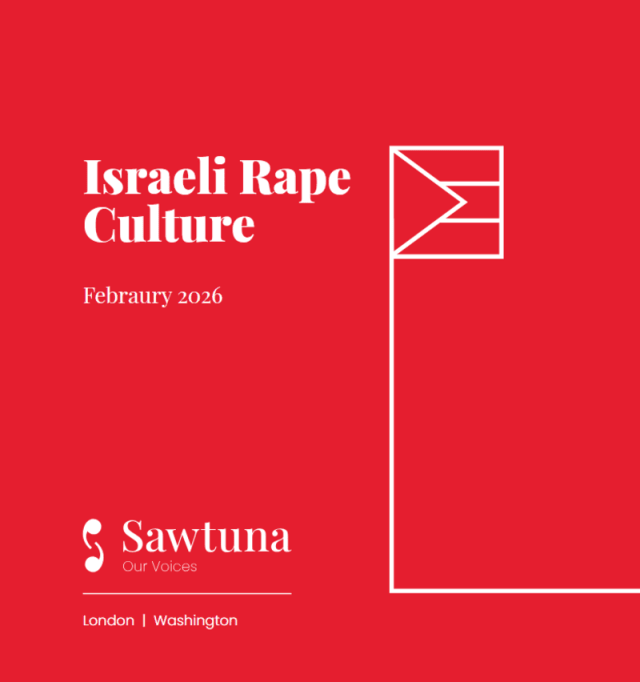
Israeli rape culture. Cultura israelí de la violación sexual. ENG ESP
Zionism is inherently imbued with rape culture. El sionismo como cultura de la violación
Publicado hoy.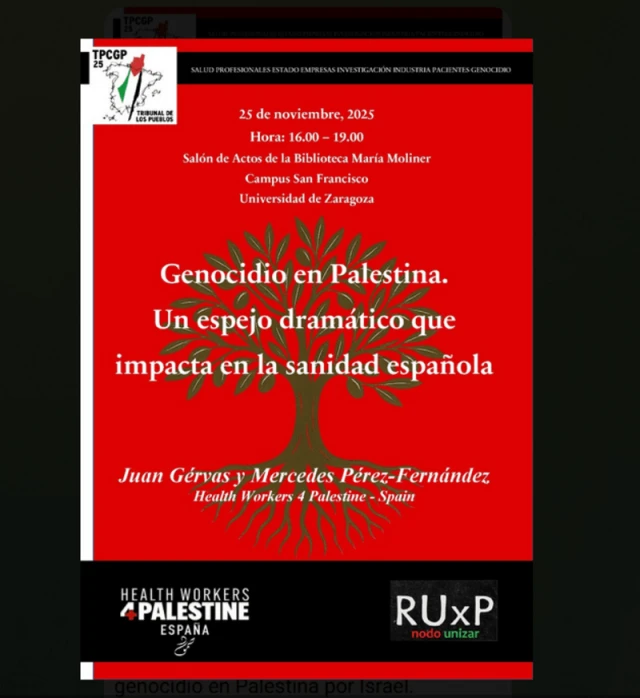
Vídeo. "Genocidio en Palestina. Un espejo dramático que impacta en la sanidad española" Vídeo 90 min
Encuentro en Zaragoza, preparación para el Tribunal de los Pueblos sobre la Complicidad con el Genocidio palestino en el Estado español TPCGP-25.
Publicado hace 2 días.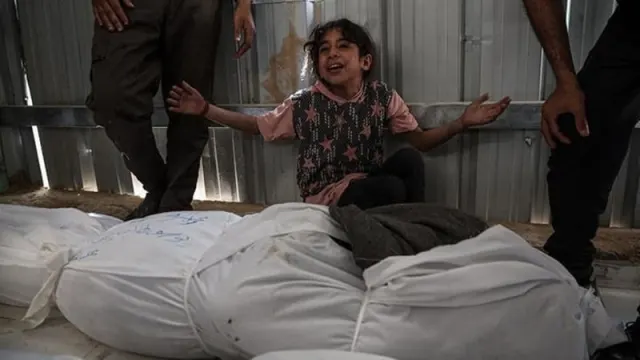
Gaza’s Orphan Crisis: 40,000. En Gaza, 40.000 huérfanos ENG ESP
40,000 children after losing one or both parents. 40.000 niños en Gaza sin uno o dos padres
Publicado hace 7 días.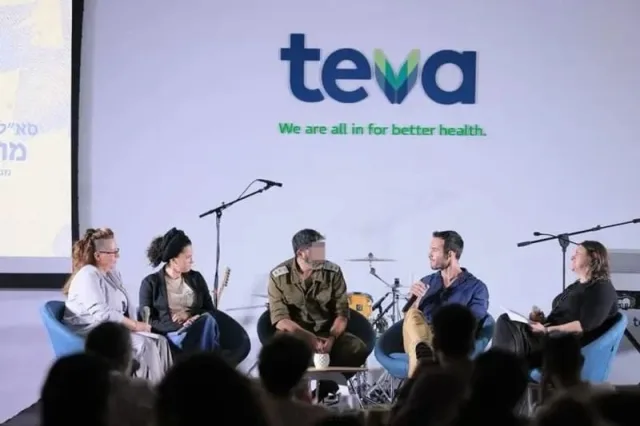
Teva y el ejército de Israel (IDF). Teva and the Israel Defense Forces (IDF). ESP ENG
Teva apoya directamente el genocidio palestino. Teva directly supports the genocide against Palestinians.
Publicado hace 14 días.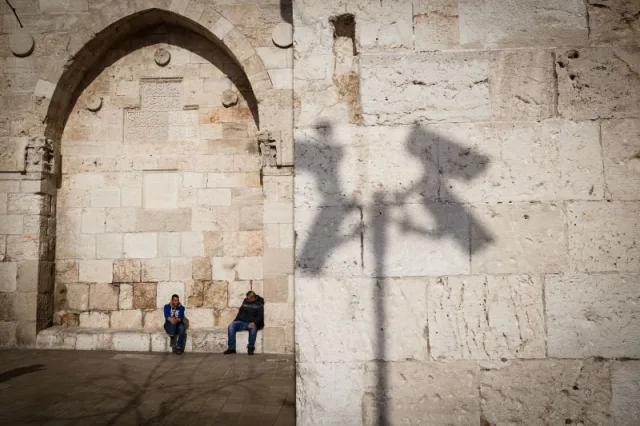
ICE operations (USA) versus Israel occupation of Gaza. EEUU, policía de inmigración versus Israel ocupación de Gaza. ENG ESP
“Imperial-colonial boomerang” in action. El «bumerán imperial-colonial» en acción
Publicado el 13 de febrero.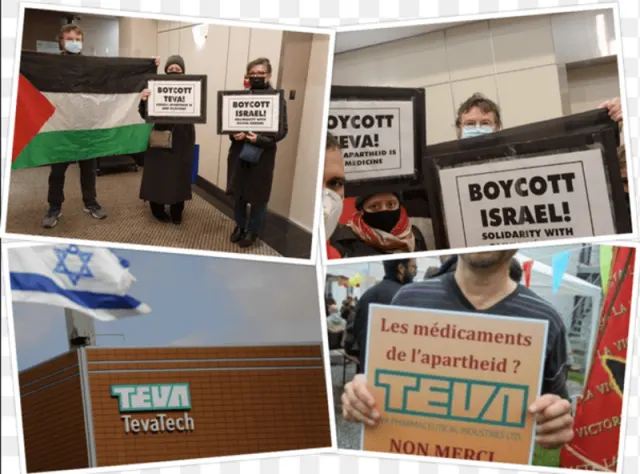
Teva, growing global backlash. Teva, boicot creciente ENG ESP
Teva: politics and business over compassion and ethics. Teva: política y negocio sobre compasión y ética
Publicado el 10 de febrero.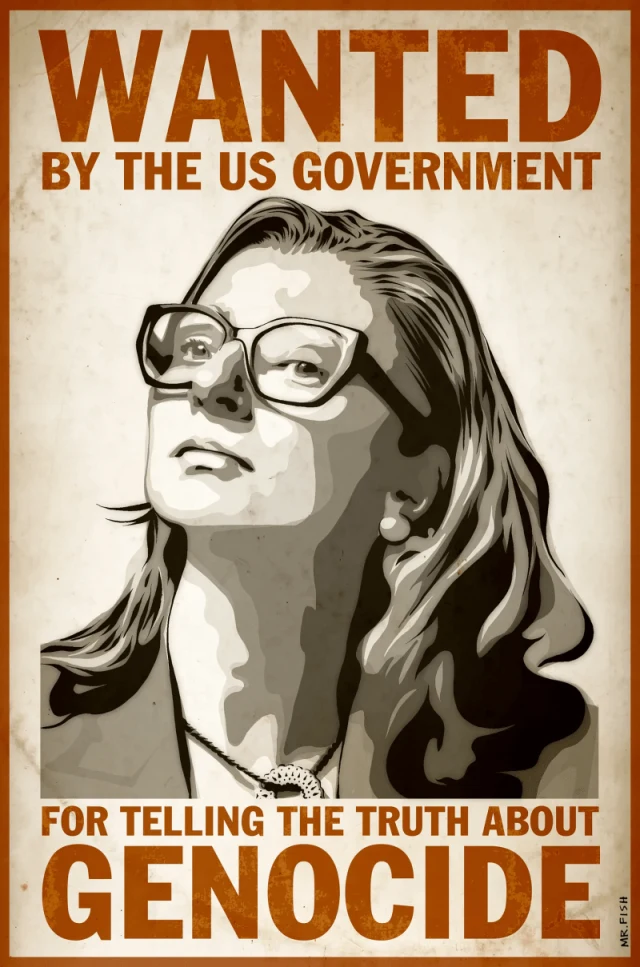
"Si Francesca Albanese es terrorista, yo también". "If Francesca Albanese is a terrorist, then so am I" ESP ENG
"Una relatora de derechos humanos de la ONU, tratadа como terrorista por documentar el genocidio en Gaza". "A UN human rights rapporteur, treated as a terrorist for documenting the genocide in Gaza"
Publicado el 9 de febrero.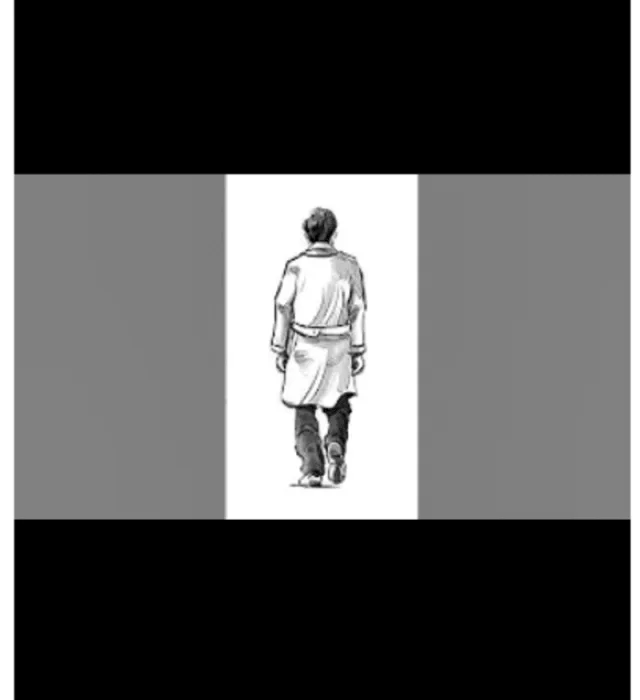
Vídeo, 60 sg. Dr. Hussam Abu Safiya. Lazos Rojos por la liberación de rehenes palestinos.
Campaña por la liberación de rehenes palestinos
Publicado el 7 de febrero.Ver más / See more



